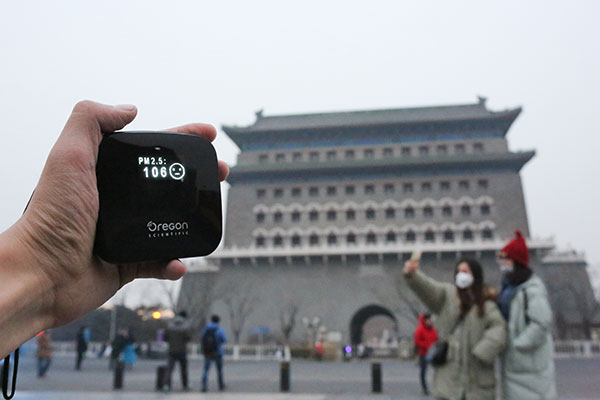Government needs better understanding of health
 |
|
PM 2.5 density stands at 106 at the Qianmen area in Beijing on Thursday afternoon. The city has experienced several smoggy days in succession.[Ding shan/For China Daily] |
Links found between air pollution and heart, respiratory and kidney problems
As China wages a long-term war against air pollution, the government is being urged to seriously study how air pollution, and smog in particular, impacts human health over the long term and deliver targeted interventions as soon as possible.
Real-time air monitoring by the Ministry of Environmental Protection showed that more than 60 percent of the 338 Chinese cities under surveillance experienced air pollution on Wednesday.
Nearly 25 percent of the cities, including Beijing, saw heavy smog, with AQI readings between 201 and 300.
The World Health Organization said air pollution continues to pose a threat to human health worldwide. About 2 million premature deaths annually can be attributed to its effects.
Wang Hufeng, head of the healthcare reform center of Renmin University of China, said China lacks surveillance, research and evidence-based evaluations of the health impact of the smog hitting increasing parts of China.
"It will be a long and tough war against air pollution, especially particulate matter, in the country and potential related health effects have to be monitored and studied scientifically and constantly," Wang said.
International studies on environmental health have found links between exposure to air pollution and heart, respiratory and kidney problems.
Xu Dongqun, deputy director of the institute of environmental health and related product safety at the Chinese Center for Disease Control and Prevention, said the specific health impacts are also highly related to the varieties of the major pollutants.
Monitoring and research for smog-related health effects in the country are necessary to devise effective countermeasures to protect public health on smoggy days, she said. And that requires cooperation among government agencies of health, environmental protection and meteorology, she added.
Globally, the WHO in 2015 for the first time urged members to develop air quality monitoring systems and health registries to improve surveillance for all illnesses related to air pollution.
In response, China's top health authority pledged in late 2016 to set up 126 monitoring sites nationwide to study the effects of air pollution on health.
The National Health and Family Planning Commission has been researching correlations between health and smog, Ma Xiaowei, deputy head of the commission, told a news conference in December.
"This work is still in its primary stage, but we are losing no time," Ma said.
China has started smog risk assessments and a program on smog warning technology to identify typical pollutants that harm people's health and establish an evaluation system, he added.
Xinhua contributed to this story.























